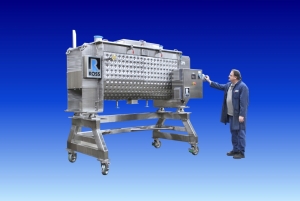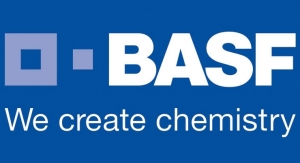06.29.16
BASF is expanding its range of high performance foam products with the innovative, certified compostable particle foam ecovio EA. The product is predominantly biobased and, like all of the grades under the ecovio brand, it supports the biological cycle through its certified compostability. The excellent properties of the patented particle foam make it particularly suitable for transport packaging for high-value or delicate goods where a high level of impact resistance and robustness is vital. The product properties are similar to those of EPS and boast outstanding energy absorption and very good resilience even when subjected to multiple impact loads. The high biobased content and the certified compostability make ecovio EA particularly attractive wherever a fossil packaging solution no longer meets customers’ requirements for a biobased and biodegradable transport solution.
ecovio EA is the first expandable, closed-cell foam material which is biobased and certified compostable. It consists of the biodegradable BASF polymer ecoflex and polylactic acid (PLA), which is derived from corn or other sugar-generating plants like manioc.
To produce ecovio EA, expandable granules are charged with the blowing agent pentane in an innovative process. This step enables trouble-free pre-expansion of the material on conventional EPS pre-expanders and subsequent molding. The raw granules themselves have a density of approx. 700g/l. ecovio EA is available in the market with a particle size of 1.05 mm. In addition, a further grade with a diameter of 0.8 mm is under development. The particle foam is available in brown and is delivered to customers in an octabin. The product can be stored there in appropriate storage facilities for at least six months without any quality impairment.
Processors can form ecovio EA into an almost limitless range of shapes in two steps. In a first step, the granules are pre-expanded with the addition of steam to produce closed-cell beads with an adjustable minimum bulk density of 25g/l. A short prefoaming time contributes to a low energy consumption in this production step.
Following this, the expanded granules can finally be processed into all kinds of different molded parts. Customers benefit from the fact that the processing can also easily take place on existing EPS or EPP production machines. The very similar processing characteristics mean that there is no need for any conversion of the machines and existing production processes do not need to be substantially modified. The processing process also strongly resembles the processing of EPS, although in general it is necessary to adapt the process parameters. This is reflected in a shorter steaming time while the cycle time in the forming step remains the same overall. In addition, it is necessary to adapt the mold geometries due to the shrinkage of approx. 1.5%. To ensure a very high quality of molded part and dimensional stability it is advisable – similar to EPP processing – to carry out component conditioning in a heating oven after the shaping.
In a direct comparison with EPS, ecovio EA has lower rigidity and when it comes to its energy absorbing capacity it comes between EPS and EPP. These properties make this material perfect for use in the E&E sector as well, in particular for heavy and delicate packaged goods such as washing machines or televisions, which need to remain unscathed right along the transport chain even if they are subjected to multiple, heavy impacts.
Furthermore, ecovio EA has a minimum thermal conductivity of 34 mW/(mK) and is therefore also outstandingly suited to all thermal insulation applications in the transport sector. For example, ecovio EA helps to maintain the cold chain at all times for temperature-sensitive goods such as packaged vegetables, fruit, meat, frozen goods or even medicines. This effectively prevents the goods from being ruined.
Due to the inherent properties of the raw materials, ecovio EA can also be stored at temperatures of up to 100°C over a period of several hours and is therefore also suitable for hot-melt adhesive applications. In addition, ecovio EA also displays good resistance in solvents such as acetone. As a certified compostable product, it also does not contain any flame retardants.
In the future, BASF will also offer ecovio EA with approval for use with food. This will extend the range of applications to all of the areas in which foam is in direct contact with processed food. ecovio EA will also be outstandingly suitable as a (reusable) transport container for processed fruit/vegetables, fish and meat.
ecovio EA is constantly durable under normal environmental conditions. Special conditions, as are found in industrial composting plants, are required to initiate the biological degradation process. In places where appropriate waste disposal channels are available through local composting plants, this scenario also makes it easier to dispose of the foam – the certified compostability means that it is possible to dispose of it along with leftover food waste – without needing to separate the materials beforehand.
Due to the high porosity and the specific surface area of the foam beads, ecovio EA degrades very quickly in industrial composting plants. Composting tests have shown that, for example, cubes of ecovio EA with an edge length of 5 cm and densities of 28-47g/l break down within the space of five weeks to form water, CO2 and biomass. Prior to composting, the material can also be recycled in grades in customary recycling processes.
When ecovio EA was developed, particular consideration was given to the market’s requirements for a predominantly biobased and compostable foam material that is also very robust. Last but not least, the product also offers a vital argument for sustainable marketing: With ecovio EA users opt for a biobased raw material that can be turned back into valuable compost at the end of its life cycle.
ecovio EA is the first expandable, closed-cell foam material which is biobased and certified compostable. It consists of the biodegradable BASF polymer ecoflex and polylactic acid (PLA), which is derived from corn or other sugar-generating plants like manioc.
To produce ecovio EA, expandable granules are charged with the blowing agent pentane in an innovative process. This step enables trouble-free pre-expansion of the material on conventional EPS pre-expanders and subsequent molding. The raw granules themselves have a density of approx. 700g/l. ecovio EA is available in the market with a particle size of 1.05 mm. In addition, a further grade with a diameter of 0.8 mm is under development. The particle foam is available in brown and is delivered to customers in an octabin. The product can be stored there in appropriate storage facilities for at least six months without any quality impairment.
Processors can form ecovio EA into an almost limitless range of shapes in two steps. In a first step, the granules are pre-expanded with the addition of steam to produce closed-cell beads with an adjustable minimum bulk density of 25g/l. A short prefoaming time contributes to a low energy consumption in this production step.
Following this, the expanded granules can finally be processed into all kinds of different molded parts. Customers benefit from the fact that the processing can also easily take place on existing EPS or EPP production machines. The very similar processing characteristics mean that there is no need for any conversion of the machines and existing production processes do not need to be substantially modified. The processing process also strongly resembles the processing of EPS, although in general it is necessary to adapt the process parameters. This is reflected in a shorter steaming time while the cycle time in the forming step remains the same overall. In addition, it is necessary to adapt the mold geometries due to the shrinkage of approx. 1.5%. To ensure a very high quality of molded part and dimensional stability it is advisable – similar to EPP processing – to carry out component conditioning in a heating oven after the shaping.
In a direct comparison with EPS, ecovio EA has lower rigidity and when it comes to its energy absorbing capacity it comes between EPS and EPP. These properties make this material perfect for use in the E&E sector as well, in particular for heavy and delicate packaged goods such as washing machines or televisions, which need to remain unscathed right along the transport chain even if they are subjected to multiple, heavy impacts.
Furthermore, ecovio EA has a minimum thermal conductivity of 34 mW/(mK) and is therefore also outstandingly suited to all thermal insulation applications in the transport sector. For example, ecovio EA helps to maintain the cold chain at all times for temperature-sensitive goods such as packaged vegetables, fruit, meat, frozen goods or even medicines. This effectively prevents the goods from being ruined.
Due to the inherent properties of the raw materials, ecovio EA can also be stored at temperatures of up to 100°C over a period of several hours and is therefore also suitable for hot-melt adhesive applications. In addition, ecovio EA also displays good resistance in solvents such as acetone. As a certified compostable product, it also does not contain any flame retardants.
In the future, BASF will also offer ecovio EA with approval for use with food. This will extend the range of applications to all of the areas in which foam is in direct contact with processed food. ecovio EA will also be outstandingly suitable as a (reusable) transport container for processed fruit/vegetables, fish and meat.
ecovio EA is constantly durable under normal environmental conditions. Special conditions, as are found in industrial composting plants, are required to initiate the biological degradation process. In places where appropriate waste disposal channels are available through local composting plants, this scenario also makes it easier to dispose of the foam – the certified compostability means that it is possible to dispose of it along with leftover food waste – without needing to separate the materials beforehand.
Due to the high porosity and the specific surface area of the foam beads, ecovio EA degrades very quickly in industrial composting plants. Composting tests have shown that, for example, cubes of ecovio EA with an edge length of 5 cm and densities of 28-47g/l break down within the space of five weeks to form water, CO2 and biomass. Prior to composting, the material can also be recycled in grades in customary recycling processes.
When ecovio EA was developed, particular consideration was given to the market’s requirements for a predominantly biobased and compostable foam material that is also very robust. Last but not least, the product also offers a vital argument for sustainable marketing: With ecovio EA users opt for a biobased raw material that can be turned back into valuable compost at the end of its life cycle.





